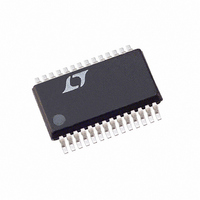LTC2418CGN Linear Technology, LTC2418CGN Datasheet - Page 38

LTC2418CGN
Manufacturer Part Number
LTC2418CGN
Description
IC ADC 24BIT DIFF INPUT 28SSOP
Manufacturer
Linear Technology
Datasheet
1.LTC2418CGNPBF.pdf
(48 pages)
Specifications of LTC2418CGN
Number Of Bits
24
Sampling Rate (per Second)
7.5
Data Interface
MICROWIRE™, Serial, SPI™
Number Of Converters
1
Power Dissipation (max)
1mW
Voltage Supply Source
Single Supply
Operating Temperature
0°C ~ 70°C
Mounting Type
Surface Mount
Package / Case
28-SSOP (0.150", 3.95mm Width)
Lead Free Status / RoHS Status
Contains lead / RoHS non-compliant
Available stocks
Company
Part Number
Manufacturer
Quantity
Price
Company:
Part Number:
LTC2418CGN#PBF
Manufacturer:
LT
Quantity:
416
LTC2414/LTC2418
APPLICATIO S I FOR ATIO
Figure 43 shows an example of a single amplifier used to
produce single-ended gain. This topology is best used in
applications where the gain setting resistor can be made
to match the temperature coefficient of the strain gauges.
If the bridge is composed of precision resistors, with only
one or two variable elements, the reference arm of the
bridge can be made to act in conjunction with the feedback
resistor to determine the gain. If the feedback resistor is
incorporated into the design of the load cell, using resis-
tors which match the temperature coefficient of the load-
cell elements, good results can be achieved without the
need for resistors with a high degree of absolute accuracy.
The common mode voltage in this case, is again a function
of the bridge output. Differential gain as used with a 350Ω
bridge is A
is half the differential gain. The maximum differential
signal that can be used is 1/4 V
in the 2-amplifier topology above.
38
BRIDGE
350Ω
+
1µF
V
A
= (R1+ R2)/(R1+175Ω). Common mode gain
V
= 9.95 =
Figure 43. Bridge Amplification Using a Single Amplifier
4.99k
(
R1
U
R1 + 175Ω
R1 + R2
3
2
U
+
LTC1050S8
–
)
5V
REF
7
4
46.4k
, as opposed to 1/2 V
R2
W
0.1µV
6
175Ω
1µF
+
U
20k
20k
REF
10µF
11
12
21
22
+
Remote Half Bridge Interface
As opposed to full bridge applications, typical half bridge
applications must contend with nonlinearity in the bridge
output, as signal swing is often much greater. Applications
include RTD’s, thermistors and other resistive elements
that undergo significant changes over their span. For
single variable element bridges, the nonlinearity of the half
bridge output can be eliminated completely; if the refer-
ence arm of the bridge is used as the reference to the ADC,
as shown in Figure 44. The LTC2414/LTC2418 can accept
inputs up to 1/2 V
must be at least 2x the highest value of the variable
resistor.
In the case of 100Ω platinum RTD’s, this would suggest a
value of 800Ω for R1. Such a low value for R1 is not
advisable due to self-heating effects. A value of 25.5k is
shown for R1, reducing self-heating effects to acceptable
levels for most sensors.
REF
REF
CH0
CH1
LTC2414/
LTC2418
+
–
GND
V
CC
15
9
0.1µF
2410 F49
5V
REF
Figure 44. Remote Half Bridge Interface
. Hence, the reference resistor R1
PLATINUM
100Ω
25.5k
0.1%
RTD
R1
11
12
21
22
REF
REF
CH0
CH1
2.7V TO 5.5V
LTC2414/
LTC2418
+
–
GND
V
V
CC
S
9
15
2410 F50
241418fa













